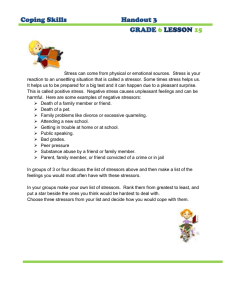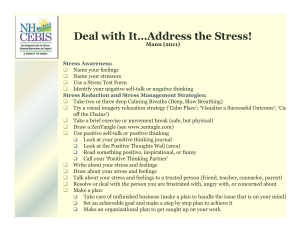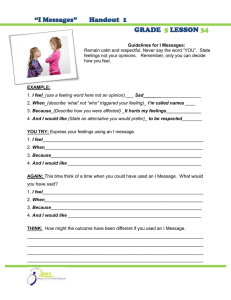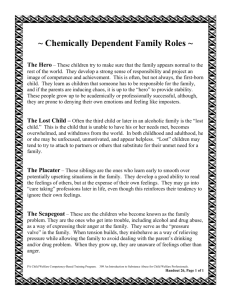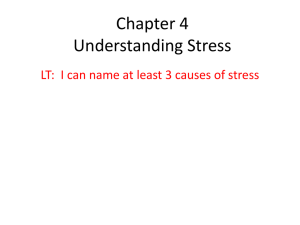Drops L Income When Your
advertisement
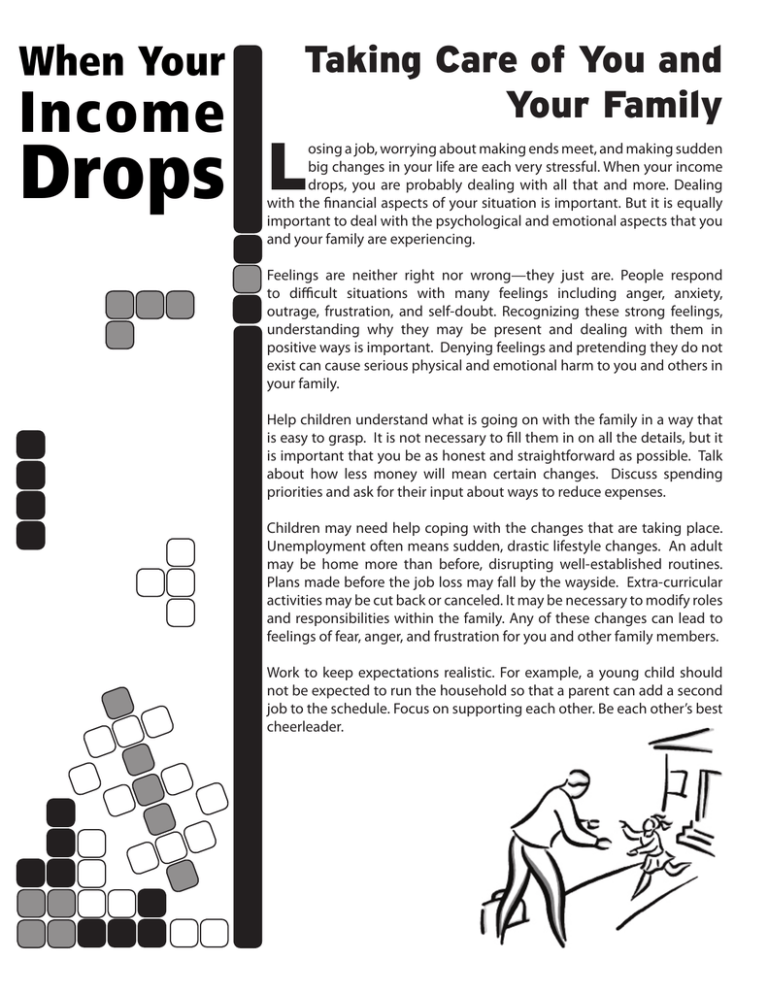
When Your Income Taking Care of You and Your Family Drops L osing a job, worrying about making ends meet, and making sudden big changes in your life are each very stressful. When your income drops, you are probably dealing with all that and more. Dealing with the financial aspects of your situation is important. But it is equally important to deal with the psychological and emotional aspects that you and your family are experiencing. Feelings are neither right nor wrong—they just are. People respond to difficult situations with many feelings including anger, anxiety, outrage, frustration, and self-doubt. Recognizing these strong feelings, understanding why they may be present and dealing with them in positive ways is important. Denying feelings and pretending they do not exist can cause serious physical and emotional harm to you and others in your family. Help children understand what is going on with the family in a way that is easy to grasp. It is not necessary to fill them in on all the details, but it is important that you be as honest and straightforward as possible. Talk about how less money will mean certain changes. Discuss spending priorities and ask for their input about ways to reduce expenses. Children may need help coping with the changes that are taking place. Unemployment often means sudden, drastic lifestyle changes. An adult may be home more than before, disrupting well-established routines. Plans made before the job loss may fall by the wayside. Extra-curricular activities may be cut back or canceled. It may be necessary to modify roles and responsibilities within the family. Any of these changes can lead to feelings of fear, anger, and frustration for you and other family members. Work to keep expectations realistic. For example, a young child should not be expected to run the household so that a parent can add a second job to the schedule. Focus on supporting each other. Be each other’s best cheerleader. Take Care of Yourself It is vitally important to eat a balanced and nutritious diet, stay physically active, and get plenty of rest. Taking care of your physical needs makes it easier to manage psychological and emotional demands. The disruption in your normal routine may provide an opportunity to develop a new routine that includes plenty of exercise. Exercise is a great way to manage stress, improve your health, and increase your energy level. A healthy dose of exercise every day also makes it easier to sleep at night. Surround yourself with positive, supportive family and friends. Sharing your feelings with loved ones helps. Isolating yourself from others may bring comfort in the short run, but is not likely to improve your situation. Wallowing in selfpity is not going to make you feel better, and may cause others to avoid you. As bad as things may be, it is not the end of the world. Count your blessings! Focusing on the positive will help you put things in perspective.A positive outlook tends to draw people to you and make them want to help. It is also more likely to lead to opportunities that can make a difference. If you find your thoughts easily drifting towards negativity, try listening to a motivational speaker or upbeat music. Take time to read an uplifting book. Make a list of five good things in your life right now. Filling your mind with positive messages helps protect against depression. Treat your job search like a real job. Spend time every day looking for a job. Structure your time by using a calendar to schedule daily and weekly job search activities. Think about volunteering with helping organizations in your community. Volunteer work can help you feel productive and may lead to employment opportunities. Try to make the most of your time. Review your accomplishments each day. Take advantage of the extra time you may have to enjoy activities with your kids, work on projects around the house, or visit with friends. If you have trouble coping, seek professional help. Talking to a trained professional can help you work through your feelings so you will feel better about yourself and your situation. An unbiased third party can also help you to evaluate your options and assist in the development of an action plan. A family counselor can help you resolve issues that you or members of your family are facing. Call Helpline Georgia at 1-800-338-6745 for help and information about where to get counseling locally. All calls are confidential and anonymous. Take Care of Your Family Besides taking good care of yourself, you also need to make sure that the needs of others in your family are being met. You may be the one most directly affected by the current challenges, but you are not the only one. Losing a job affects every member of the family. Even small children who may not know what is going on are aware that something is different. Too many changes at one time can be overwhelming for anyone—especially children. Stick to old routines and patterns as much as possible. Help your children stay in touch with their friends and pursue outside activities. Replace family activities you can no longer afford with low- and no-cost activities. Consider biking, playing board games together, reading books aloud to each other, and visiting points of interest in the community. Enjoy fun, creative and often free programs offered for children at the library, local churches, youth centers and community parks. Open communication is an essential ingredient in building strong families. Family meetings can make a big difference. Especially when times are hard, family members need an opportunity to discuss how they feel about the changes taking place. Allowing everyone in the household to offer suggestions for how to cope during this difficult time helps them to feel like part of the solution. Avoid blaming each other for the situation because that only creates more stress and doesn’t produce positive solutions. Having everyone on the same team and working toward the same goals also helps children to feel like they are doing something to help. Everyone needs to feel free to express themselves and to know that those who care about them will listen. Sometimes, just listening is enough. Sharing a problem or how you feel with another person can make a difference. Having all the answers is less important than being willing to actively listen. Dealing with Stress Taking care of yourself and your family means you need to understand stress and learn ways to manage your stress load. Stress is a normal part of life. But when your income drops your stress level generally increases. Allowing stress to build up leads to anger, headaches, depression, back and stomach problems, feelings of helplessness, self-hate, feeling tired all the time, eating more or eating less, having trouble sleeping, being sick more often, using more alcohol, and sexual problems. Stressors are things that make you feel stressed. Learn to recognize what your stressors are and how you react when you are stressed. It often helps to make a list of the stressors. Identifying your stressors and your reactions to stressors will give you an opportunity to make a plan to fight back. When life is stressful it is more important than ever to eat right, exercise, and get adequate sleep to reduce stress levels. Do not try to deal with your stress alone. Friends and family can be vital resources and sources of support. They can be someone to confide in or even someone who will keep your child so you can search for a new job. Whatever your goal, planning to reduce stress will help you get things done. Focus on one stressor you can control. What can you do to prevent or deal with that stressor? Do you need to involve others to carry out your plan to reduce or eliminate the stressor? Having a plan to reduce stress for your job search, your week, and the future is the key to success. Adversity can either separate us from loved ones or draw us closer together. It all depends on our reactions during those difficult times. Commitment to one another, open communication, personal responsibility and an understanding and caring attitude help create a climate of emotional well-being for the family even in the midst of challenging circumstances. Christa Campbell County Extension Agent for Family and Consumer Sciences Elbert County Andrea Scarrow County Extension Agent for Family and Consumer Sciences Colquitt County The University of Georgia and Ft. Valley State University, the U.S. Department of Agriculture and counties of the state cooperating. Cooperative Extension, the University of Georgia College of Agricultural and Environmental Sciences, offers educational programs, assistance and materials to all people without regard to race, color, national origin, age, gender or disability. An Equal Opportunity Employer/Affirmative Action Organization Committed to a Diverse Work Force HACE-E-74-7 February 2009 Issued in furtherance of Cooperative Extension work, Acts of May 8 and June 30, 1914, The University of Georgia College of Agricultural and Environmental Sciences and the U.S. Department of Agriculture cooperating. CAES Dean J. Scott Angle, Director FACS Dean Laura D. Jolly, Associate Director
